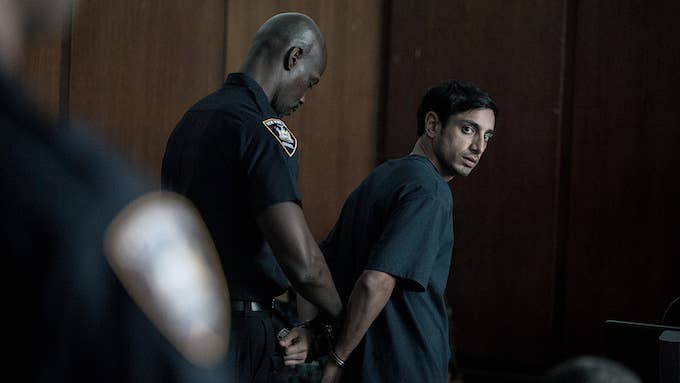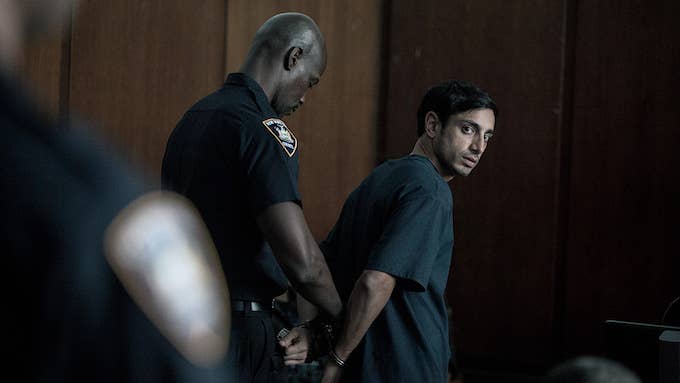
It was only a few weeks ago that The Night Of became HBO’s surprise summer breakout. In its first four episodes, the eight-part miniseries created by master screenwriters Richard Price and Steven Zaillian has proved itself to be a thoughtful, tense, and layered drama that explores intersections of race, class, and cultural dissonance.
Leading the series is English actor Riz Ahmed, who plays Nasir "Naz" Khan, a college student who steals his dad’s cab to have a fun night out but ends up picking up a troubled young woman, going back to her place, doing drugs, and waking up—with no memory of the night’s debauchery—to her dead. The series takes a hard look at the case that naturally forms against Naz, how he copes in holding, the financial and emotional strain it has on his Pakistani-American parents, and at the bizarre but ultimately competent lawyer who decides to take his case (John Turturro).
Outside of his impressive work in The Night Of though, Ahmed, 33, has a lot to boast. He got his major break in Nightcrawler alongside Jake Gyllenhaal, just had a significant and memorable role playing a Mark Zuckerberg-type in Jason Bourne, and will be one of the leads in Rogue One, the upcoming Star Wars film. Later this year, he’ll appear in Una, a drama starring Rooney Mara, that will open at the Toronto International Film Festival. Ahmed is also a rapper, and released a political mixtape called Englistan earlier this year.
Complex spoke with Ahmed to discuss the HBO series—what happened in last night’s episode—diversity in the U.K. vs. the U.S., and about how he snagged a role in two of this year’s biggest blockbusters.
I know it’s been some time since you first read the pilot for The Night Of, but what drew you to the script?
To be honest, I read it without any context or background. I didn’t even know who had written it. I had a very vague idea of HBO because we don’t have HBO in the U.K. and this was before the Golden Age of TV had really started kicking in. It was 2012 on the way back from the Venice Film Festival after I had done The Reluctant Fundamentalist. My agent sent me the script and said, “Just read this.” It happened very quickly. I think they were right at the end of their casting process. Because I didn’t have a chance to overthink it, it went that way. I think it’s like that with good writing sometimes. It does a lot of the work for you.
Even though it was conceived so long ago the series feels so important today, perhaps more than ever.
Richard and Steve are all about authenticity and detail. It’s their job to put the finger on the pulse and just reflect that reality. It’s only sometimes when those winds build to a full blown hurricane that we go, “Look, oh my god. Look what is in the winds. This is race relations, criminal justice, and Black Lives Matter, and Islamophobia. These are all big things now.” Actually, they’ve been big things for a really long time. It’s interesting that these things have come to the forefront of our culture in terms of the attention they gain, but these things have always been issues.
At the same time, the race relations and those tensions are handled so delicately, with a lot of nuance. Freddy constantly makes Naz aware of the Muslims he is encountering in holding, and frames them as posers. There was that line about the Gaza Strip being in Vegas. What do you make of that?
In terms of the nuance and race relations, I think that’s something that, again, they are all about the detail. It was something they wanted to get right. They would ask me about the way the characters pray or what Naz’s family background is. You have to treat audiences as adults, but I think it is important to know that nuance in the American Muslim population. Of course you’ve got the Nation of Islam, Five Percenters. You’ve got Sunni Muslims. I think they often have different experiences. From my understanding, African American Muslims, socioeconomically, can be a lot more worse off than American Muslims from migrant backgrounds, like South Asian or Middle Eastern backgrounds. There is a class tension there and a cultural thing there as well. It’s through telling stories accurately that we appreciate the specificity of different characters and communities.
Shifting to last night’s episode, we're at the halfway point now. Naz finally asks Freddy for help. What can we start expecting from Naz in the last four episodes.
I certainly don’t want to say anything about that, but I will say that people are a product of their environment and the circumstances around them. That’s all I’ll say. [Laughs.]
This could just be an assumption, but obviously the prison industrial complex can have a way of making someone innocent into something else.
You know, big organizations, big bureaucracies, big systems ultimately are dehumanizing. You are assigned a number. You are not a person. You are isolated from the things and people you love. It’s essentially dehumanizing, the project of incarceration. When we were shooting, I remember coming to find out about more and more instances of people just being in the justice system and it taking its toll. Sometimes it toughens people up. Sometimes it breaks them down. Sometimes it’s both. It could go a number of very different ways for Naz.
You’ve spoken about the U.K., relative to the U.S., and how it lags in depictions of multiculturalism on film and television. Why do you think that is and what are the some of the obstacles you’ve faced working here?
I think that after the financial crisis, a lot of people—with the changing marketplace for film and television, there being more content out there—would often double down on safe bets. Whether that’s superhero franchises or period dramas, which is something that the U.K. exports very successfully. It’s also a strange denial. I think a lot of American cities are more segregated than, say, London or some other European cities. But America’s idea of itself is one that is super multicultural—all different races and religions side by side in their stories. I think Britain’s idea of itself is slightly deluded in a different way. Its idea of itself is really white, when in reality it’s really really multicultural with different classes and colors living in major cities. It’s interesting, in a way, that both societies are enamored with different visions of themselves. That’s what they export almost out of habit.
Outside of The Night Of, you have a lot going on. You’re in the new Bourne film and then you will be in the upcoming film Rogue One. How did these roles come about? How did you transition from indie film to these big budget blockbusters?
I’m used to working on indie projects where we have less resources and less time. That carries its pros and its cons. Sometimes you don’t have time to overthink things. You have to go with your gut. But it also means you don’t necessarily have the chance to go back and redo things. It’s definitely an adjustment, the same way that doing The Night Of was an adjustment, filming for eight months instead of five weeks. In terms of how I got those roles, it was my indie film work. Gareth Edwards, who himself has an indie film background, was someone who comes from that world and had seen some of my work. He wanted me to audition for Rogue One. Similarly, [Bourne director] Paul Greengrass is someone who is from that world. He was shown some of my work and wanted me to come and join that project. I was lucky that people came across my work.
Were you a fan of the Star Wars franchise before?
It was something I grew up with. My earliest memory watching any kind of film was watching VHS tapes of Star Wars movies over my brother’s shoulder as a little kid. But I didn’t really have a clue what the hell it meant. It was super confusing and there were these weird different creatures. But it left such a mark on me. It really inspired me and excited me. I think that’s an amazing thing about these movies. They can be watched by different age groups for different reasons. Kids may not understand a full story but they are swept away with the images, the characters, the creatures, and the worlds that are created. All the audiences can really enjoy some of the allusions from one film to the other film.
Was it a very easy decision for you to join the Star Wars world or did you have any apprehensions?
It was a no brainer for me. Alongside with working with good directors, I’m really excited to work with good actors. I’m someone who likes to observe how people work and learn about working with different people. So working with someone like Matt Damon or Alicia Vikander or Tommy Lee Jones, that’s always going to be interesting. Likewise working with Ben Mendelsohn and Diego Luna and Jiang Wen and Felicity Jones. I feel we are the sum of our experiences and I want to get a lot of good experience working with good people.
On a personal level, what does it mean for you to be involved in this effort to spearhead diversity in the Star Wars franchise?
It’s about time that our films and our culture reflect the world around us. I’m proud to be part of projects that are leading in that way whether it’s The Night Of or Rogue One.
Is there anything you can tease about your Rogue One character in the movie?
I can say that my character Bodhi Rook is a cargo pilot for the empire.
That’s it?
Yeah. [Laughs.]

